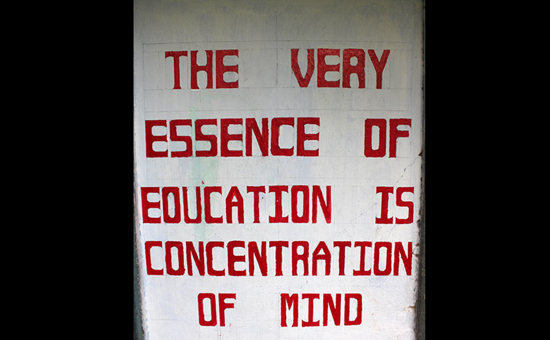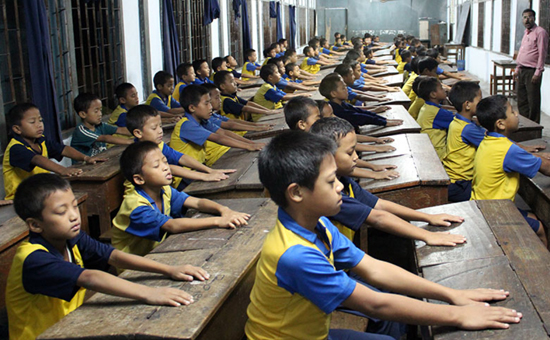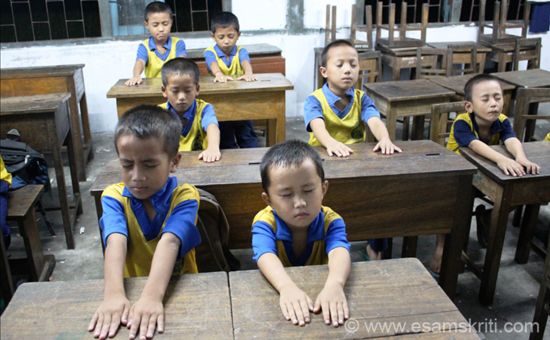- What is the role and approach of Velammal Nexus Schools Chennai in promoting chess? Does learning chess
help in academics and how? Chess requires more of India Inc support if Bharat
has to excel in the long-term.
In an earlier article chess teacher Akshay Hiremath wrote Why Tamil
Nadu is producing high quality Chess players In brief he said, Tamil
Nadu is producing high quality chess players because an
ecosystem towards chess has been created, inspired by performances of players
like International Master M Aaron and Grand Master V Anand, plus a
temple that has a historical association with chess.
This article looks the metropolitan
city of Chennai i.e. home to Velammal Nexus Schools, who are actively promoting
the game of chess. They are a group of 15 schools with 2,500+ teachers and
close to 40,000 students.
What makes Velammal Nexus special is that two of their
students are currently the forerunners in the field of Chess and have been
anointed as Grandmasters.
Both R. Praggnandhaa
and Gukesh D. have done India proud and brought home the highest honours.
What is
interesting is that this is not just a lucky coincidence but the result of
years of concerted efforts by the school, parents, teachers and students culminating
in the creation of champions.
Founded by Thiru. M V Muthuramalingam and managed by Thiru. M V M Velmohan, the Velammal Nexus schools have for the last 20+ years given equal focus to extracurricular activities and academics, with the objective of providing holistic education and all-round personality development opportunities for their students. This includes professional training in indoor and outdoor sports.
The school’s unique approach has paid off phenomenally as they have successfully produced over 100 titled
Chess players, which includes 26 Chess Grandmasters – 22 men and 4 women Grandmasters – so far and counting!
Vishwanathan Anand bagged the title of Grandmaster for the first time in 1988 and put India on the Chess Championships map. Subsequently, India has produced 82 Grandmasters. Tamil Nadu and Velammal Nexus schools are playing an important role in establishing India’s dominance in Chess.
The contribution
of the team of 10 Chess teachers, who are working to train close to 2,000
students across all branches of the group, is the driving force behind this
unmatched success.
Chess trainers and Coordinators, who are part of Velammal Nexus, take on the role of ‘all-round mentors’ for their students.
Thiru. Velavan
Sir, Chess Coordinator and Teacher at Velammal Nexus explains that students
begin training in Chess right from the age of four and continue to hone their
skills, under the tutelage of these mentors, till about the age of eighteen.
They are not
only taught the rules, regulations and techniques involved in playing Chess,
but also trained in improving concentration and adopting a disciplined approach
to the game. Regular practice of Yogasanas and Physical Education help students
become calm and have a composed outlook. Whilst they imbibe this as part of
learning chess it also helps in life.
I am sharing a
few glimpses from the Ramakrishna Mission School in Along, Arunachal Pradesh
and their focus on developing concentration skills.
 Board at Ramakrishna Mission School Along, Arunachal Pradesh.
Board at Ramakrishna Mission School Along, Arunachal Pradesh.
 Every evening young students at RKM School are made to sit like this and concentrate.
Every evening young students at RKM School are made to sit like this and concentrate.
 Close up of children learning to concentrate.
Close up of children learning to concentrate.
In addition to learning how to play the game, Velavan Sir states that students are also given a background about the historical origins of the game and its Indian roots. Students are oriented to the history of the game of Chess or ‘Chengalam’, also known as Anaikuppu in Tamil. It was played in
India much before the 6th Century CE and subsequently spread from
the Indian Sub-continent to Mongolia, Russia, Korea and westwards to Persia and
further to Europe.
Read Origin of
Chess aka chaturanga
An interesting
observation about these budding champions is that they also perform equally
well, if not better, in academics. Most of these students score over 85% marks.
So,
does chess help kids in academics?
Velavan Sir
points out that learning chess has a profoundly
positive impact on the mindset of students as they are not easily
distracted by entertainment and social media. They learn to maintain a healthy
balance between work and play. Moreover, with highly enhanced concentration
skills, they are also attuned to analysing every
situation from multiple perspectives and taking timely decisions. All
these traits put them in good stead academically, during their examinations and
also in every other aspect of life.
Gurgaon based chess teacher Akshay Hirenmath says, “From my experience, I can certainly say that chess helps kids in logical thinking and problem solving. It also teaches them life skills like patience and perseverance, and not always expecting instant gratification. It also teaches them to be competitive. The sport demands that they put in hard work, because to progress beyond a certain level certainly requires a lot of study. Chess also has a requirement that kids bank on their memory because certain aspects of the game - chess opening in particular - certainly require a significant amount of memorizing. All these are skills that are undoubtedly helpful and useful in life, and by sharpening such skills, kids can probably excel in other academic pursuits as well.”
Akshay adds, “Another observation based on my conversations with the 100+ children is that really intelligent, right-brained students who are brilliant in languages, humanities and creative pursuits, struggled to do well in chess. Conversely, left-brained students who are good at Mathematics and Sciences have taken to the game of chess more easily.” He clarifies this is his observation and has not been scientifically proven.
Those who have been following Praggnandhaa’s and Gukesh’s successes are also familiar with their humility and respectful behaviour towards seniors like Vishwanathan Anand. It is heartening to see these young stars develop into worthy role-models for fellow-youngsters, both on and off the chess-board.
By focusing on
multi-dimensional education, character-building and all-round development of
students in academics and sports, Velammal Nexus
presents a stellar example that can be emulated by schools around the country.
With local idols
like Vishwanath Anand, R. Praggnandhaa and Gukesh D, we hope that Chennai and
Tamil Nadu continue to produce outstanding players.
Role
of Corporate Sponsorships
In case of
Velammal Nexus, in addition to the unstinted support from the School
Management, companies such as the Adani Group, Ramco Systems and Microsense are
providing sponsorships to support the budding champions.
With this kind
of raw potential and talent in the field of Chess available not only in Tamil
Nadu, but in other parts of India as well, corporate sponsorships will play a
huge role in putting India firmly on top of the table. Countries like USA and
Russia dominate this space, while India today ranks 5th in the tally
of Grandmasters. There is tremendous scope for corporates to play a much larger
role in supporting sports like Chess, where India is making a huge mark on the
global stage.
To read all articles by author
Akshay H and
Sanjeev N contributed to this article.